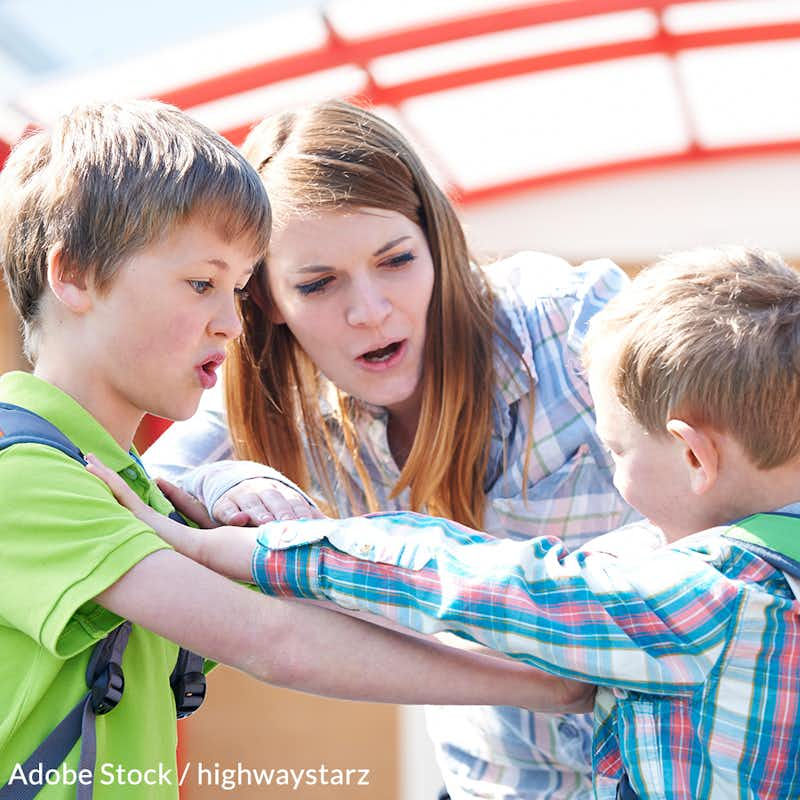Our Schoolchildren Need Conflict Resolution Programs
8,840 signatures toward our 50,000 Goal
Sponsor: The Child Health Site
Young children need healthy outlets for conflicts. Sign the petition to require conflict resolution programs in schools.

With all of the civil unrest going on in the world today, it's time we examine the values we're passing on to our children.
In order to know how to handle conflict in healthy way, we need models of healthy conflict resolution. Fighting and screaming can lead to pain, but adults who bottle their emotions rather than disagree deny children children the opportunity of learning how to deal with conflicts at all1.
To truly learn about conflict resolution, students must also analyze the conflict2. They'll need to be able to identify the problem and try to understand what's causing it. Teachers can help by teaching:
- Understanding: Students need to understand what conflict is and its negative impact on others.
- Empathy: Empathizing with the other person's feelings helps students see the effects of their conflict.
- Responsibility: Students involved must learn how to take responsibility for their own part in the conflict, no matter who started it.
- Communication: It is important to use words to resolve the conflict so the students can come to a mutually beneficial solution.
- Choice: Not every situation is black and white. Children need to see more than one strategy to solve a conflict independently.
In order to minimize conflict, teachers can offer:
- Prevention: Helping kids avoid conflict is much easier than solving it. To prevent conflict, teachers must be proactive in teaching the skills kids need to solve their ongoing issues3.
- Literature: Children's literature can be used to provide examples of times when empathy, perspective taking, and patience are needed. Discussing how these stories relate to real-life conflict provides a strong foundation for kids3.
- Praise: Praising students for doing something right usually gets more kids on task than punishing a student who is off task. The same is true of conflict, where skills like sharing and patience are important3.
Most of all, it is important to think of conflict resolution as just that, resolving, not winning. Fights are "won." Conflict is "resolved." Resolving a conflict doesn't necessarily mean those involved are "right" or "wrong," or that they even get what they want4.
Although a great deal of education funding has been cut in the US5, it is imperative that children are taught how to constructively manage difficult situations with their peers. Sign the petition asking the Secretary of the Department of Education to support this cause by requiring public schools to implement conflict resolution and grief management programs for children.
- Tiffany Frye, A Fine Parent (2015), "Teaching Your Kids How to Resolve Conflict Without Fighting."
- Elyse Rycroft, Proud to Be Primary (2021), "Conflict Resolution Activities: Effective Ideas for Classrooms."
- Amy Curletto, James Stanfield (2020), "Quick & Effective Conflict Resolution Strategies for the Classroom."
- Kim Abraham, LMSW and Marney Studaker-Cordner, LMSW, Empowering Parents (2021), "When Your Home is a Battle Zone: How to Resolve Conflicts Peacefully."
- Michael Leachman, Kathleen Masterson, Eric Figueroa, Center on Budget and Policy Priorities (29 November 2017), "A Punishing Decade for School Funding."
The Petition:
To the Secretary of the Department of Education,
I am concerned about the social development of schoolchildren in the United States today. It seems that now more than ever, bitter wars continue to escalate and physical combat is commonplace. Children are exposed to physical violence in the media and at home on a regular basis, and consequently they're led to believe that aggression is a valid way to solve interpersonal issues.
We all know this is not true, however. Violence only leads to pain and suffering, and moreover does not cure problems. In fact, it only fosters them. We need to encourage our children, both at school and at home, that talking about their thoughts and feelings has positive effects and can very effectively solve a dispute or difficult situation.
Conflict resolution programs must be implemented so that children have a safe haven to consult when they don't know how to approach a conflict. If they aren't given a forum upon which to discuss their feelings rationally, they may resort to what they deem to be quick solutions, which often involve physical violence.
Please work toward requiring all public schools to invoke conflict resolution and grief support programs so that our children may grow up without ever thinking violence is an option.
Sincerely,